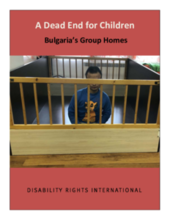The main finding of this report from Disability Rights International (DRI) is that Bulgaria has replaced a system of large, old orphanages with newer, smaller buildings that are still operating as institutions. While the new facilities are officially referred to as “family-like” residences or “small group homes,” DRI’s investigation finds that they are neither small nor are they family homes. In fact, they are mostly 14 bed facilities. Many group homes are run by one local authority, leaving a few administrators responsible for dozens of children. In one case, DRI investigators observed three houses grouped together to create what was effectively a congregate living arrangement for 42 children. Some “group homes” are placed in the deserted corridors of the same old orphanage buildings that were supposed to have been closed. These institutions separate children with disabilities from society and contribute to their continued social isolation – leading to a lifetime of segregation for a new generation of people with disabilities. As this report shows, placement in Bulgaria’s group homes exposes children to emotional neglect, inappropriate and potentially damaging models of behavior, and, in some cases, violence, bullying, and other forms of abuse that are common in institutions.

